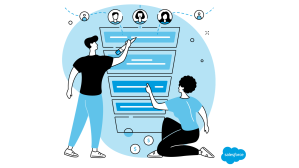Over the past two years, digital engagement hit a tipping point, with more customer interactions taking place online than in the real world. This rapid digital acceleration was initially seen as a temporary measure to compensate for the pandemic and its associated restrictions. As time has passed, though, it has become clear that it’s here to stay.
The stratospheric rise of the digitally driven market has generated and continues to generate unfathomable amounts of customer data. This data can cover the whole buying journey, from the initial search all the way to the post-sale follow-up. For marketers, this data is largely useless unless it’s put to effective use.
That is where automation comes in. When fed into and optimised through a customer relationship management (CRM) platform, that data can be automated in a variety of ways that directly improve your marketing ROI. The good news is that automation doesn’t have to be complicated and there are several things you can do to get started right now.
Automation’s many paths to improved ROI
The pot of gold for marketers in 2022 will be forming the deepest possible relationship with the individual customer, often without the luxury of face-to-face interaction.
The only way to achieve such intimacy is through a comprehensive and dynamic view of that customer’s digital behaviour. This is exactly what Marketing Cloud offers. It takes customer data from a range of sources and creates actionable insights for you to take forward.
Here are some of the many rewards reaped by automation tools:
Improve customer satisfaction
Marketing Cloud allows you to understand everything about your customer. This knowledge allows you to identify their unique wants and needs. You can then show them content, assets, and messaging at the right time in the right channel.
In other words, the customer is getting exactly what they want, when they want it.
Attract return customers
A continuation of that benefit is the ability to attract return customers. As you’re able to provide such granular personalisation, relationships become ongoing and open-ended. Within Marketing Cloud, you’re able to make use of applications such as Email Studio, Journey Builder, and Interaction Studio. Each of these offer unique ways to nurture personalised customer experiences at every touch point.
Boost lead conversion rates
Personalisation based on in-depth data means higher levels of customer engagement. The more customers you engage through automation, the more leads you’re able to convert.
Foster customer loyalty
Marketing Cloud’s Loyalty Management application gives you the ability to automate personalised loyalty programmes. Add this to the opportunities for personalised shopping experiences provided by Commerce Cloud, and you have a powerful combo to foster customer loyalty.
Accelerate speed of execution
Not only is setting up automation simple, but thanks to the degree of automation available to you, you’re able to work faster, which frees up more time to focus on other important tasks.
Optimise ad buying
Thanks to highly customisable audience automation, you can feed segments directly into the world’s largest social media platforms. Segmentation is also an automated breeze, as you can ask the CRM to find customers similar to your best customers. Alternatively, you can stop showing ads to newly acquired leads, then funnel them into a new segment, saving you money.
The integration jackpot!
Marketing Cloud integrates with a group of specialised Salesforce applications, each one designed to deepen your relationship with customers and improve marketing ROI. Salesforce’s newest application that integrates with Marketing Cloud is Customer Data Platform (CDP). It allows even more powerful data-driven insights for deeper personalisation, to the point where you can get to know and cater to the individual customer.
When looking at the data sources that feed into Marketing Cloud, the world is your oyster. Whether you’re using Sales Cloud, another CRM platform, or even disconnected data points such as contact information, that data can be fed into Marketing Cloud. In other words, if you’ve got some data from somewhere, you can bring it in, work with it, and use it as the basis for automation.
Getting on board the automation train
If you’re new to the automation of marketing data, the prospect can seem a little overwhelming. Before you start, it’s important to know which kinds of marketing data can be automated. The short answer is almost everything. If you can write a process down on paper, then you can automate it.
A helpful way to determine what requires automation is to take a forensic look at your current processes and operations. Note down what is taking up the most time in the execution of campaigns, and target these first. For example, finding similarities between individual customers and creating segmented audiences can take a huge amount of time without automation. The task here is to do your research and due diligence, look for these procedural weaknesses, and determine what can be automated through Marketing Cloud.
Another way to frame your plan of attack is to analyse your existing data sources. For sales, if you’re relying on online spreadsheets that don’t talk to each other, you might benefit from feeding that data into a CRM such as Sales Cloud, then integrating it with Marketing Cloud. Similarly, if you’re using disconnected data sources to track individual metrics, you may look into consolidating those into a single source.
Whatever the case may be, know that if your data pipeline is siloed and unwieldy, there are ways to bring it all together to achieve a single source of truth.
Don’t rush, or be a prisoner of the moment
A common pitfall for organisations who discover the power of automation is that they attempt to do too much at once.
These platforms are operational investments and are designed to become mainstays of your business. Therefore, you should start slowly and really dig into your existing processes and systems. This should allow you to understand which product or combination of products will best serve your objectives.
That aside, these products can only serve you if your data is of a high quality. A CRM gives you a database of past purchases, as well as demographic data, customer preferences, key contacts, and any problems that the customer may have encountered. High-quality CRMs take it even further, tracking clients and leads as they progress through the marketing pipeline. The better the quality of your data, the more you’ll be able to benefit from automation, and the more your marketing ROI will improve.
Read about how Marketing Cloud has helped other businesses automate their marketing.
























